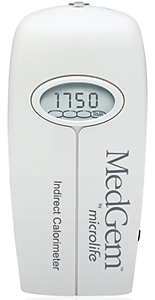 The Microlife BodyGem and MedGem indirect calorimeters measure Resting Metabolic Rate, to help Bariatric Doctors, Nutritionists, Dietitians and Personal Trainers; optimize the weight management results of their clients.
The Microlife BodyGem and MedGem indirect calorimeters measure Resting Metabolic Rate, to help Bariatric Doctors, Nutritionists, Dietitians and Personal Trainers; optimize the weight management results of their clients.
Microlife Medical Home Solutions is assisting physicians’ and their medical practices with implementing a patient-centered, physician-guided approach to an improved evaluation, diagnosis and treatment of cardiovascular, pulmonary, and metabolic diseases.
The MedGem and BodyGem Indirect Calorimeter by Microlife is a handheld, portable indirect calorimeter that measures oxygen consumption (VO2) and RMR.
MedGem® Case Study: University of Nevada Center for Nutrition & Metabolic Disorders
Company Overview
The Center for Nutrition and Metabolic Disorders (CNMD) at the University of Nevada School of Medicine assists with the evaluation and treatment of self-referred individuals and physician-referred patients through an experienced interdisciplinary team including physicians, registered dietitians, exercise/physical activity consultants and behavior specialists. The team provides a comprehensive program for successful long-term weight management.
Program Overview
Individuals in the program receive a physical examination and comprehensive medical evaluation, including resting metabolic rate (RMR) measurements with the MedGem indirect calorimeter, body composition analysis, and body measurements. The registered dietitians develop individualized calorie prescriptions and activity goals based on measured resting metabolic rate and lifestyle activity. The program has a strong behavior modification emphasis, including software for self-monitoring (i.e., MiHealthLog) and remote monitoring feedback (i.e., MiHealthCoach) via the web. Participants then are offered a variety of 6-month follow-up programs tailored to meet their individual goals and needs. Assessments are made after significant weight losses of 20 lbs and/or 6-month intervals.
Utilizing an individualized approach to their weight management program,
- 53% lost ≥ 5 their body weight
- 15% lost ≥ 10% of their body weight
- 5% lost ≥ 20 % of their body weight
Of those currently participating in the program, ≥ 70% have lost enough body weight to impact their health risk. The attrition rate is very low and patients continue in the program for long term follow-up of weight maintenance and prevention of weight gain and/or regain. Daily monitoring of dietary intake and physical activity with MiHealthLog are key components to changing diet and exercise habits. Self-monitoring has been identified as one of the most effective strategies for weight loss and weight maintenance
CNMD encourages the use of MiHealthLog software, for quick and easy self-monitoring. MiHealthLog provides food logging, exercise logging, and summary reports that reinforce the concept of balancing energy intake and energy expenditure.
CNMD previously used Microlife’s BalanceLog® and switched to MiHealthLog due to its use online and similarity in reporting functions. CMND recently started using MiHealthCoach as means to monitor their patients remotely.
Bariatric Application
The CNMD assists with the evaluation and treatment of patients electing to have surgical treatment for morbid obesity. The interdisciplinary team includes physicians, registered dieticians and behavioral specialists.
CNMD includes MedGem measurements, in both pre- and post-surgery assessments. Their data shows clinically significant decreases in RMR post surgery. This is a commonly accepted characteristic of weight loss. Among 12 bariatric patients, average age of 47 years and average baseline BMI of 44.1 kg/m2, the average weight loss was 53 lbs at 3 months post-surgery. The average decrease in RMR was 739 kcal/day.
The average RMR was 2391 kcal/day pre-surgery and 1652 kcal/day post-surgery. Additionally, the changes were unique among individuals. For example, of the individuals who lost between 40-50 lbs, changes in metabolic rate varied 3-fold (-370 kcal/day
to -1070 kcal/day).
The individual differences and dramatic changes in RMR during weight loss highlights the importance of measuring RMR to provide individual clients with a valid and personalized weight management plan. This is especially true for patients who attempt to lose weight prior to bariatric surgery or require additional assistance post surgery.